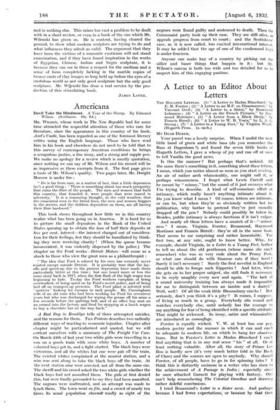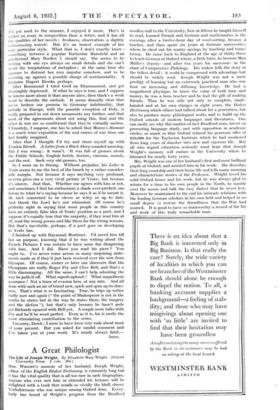A Letter to an Editor About Letters TELE HOGA,RTH LETTERS.
(1) "A Letter to Madan Blanchard," by E. M. Forster ; (2) "A Letter to an M.P. on Disarmament," by Viscount Cecil ; (3) "A Letter to a Sister," by Rosamond Lehmann ; (4) "A Letter on the French Pictures," by Ray- mond Mortimer; (5) "A Letter from a Black Sheep," by Francis Birrell ; (6) A Letter to W. B. Yeats," by L. A. C. Strong ; (7) "A Letter to a Young Poet," by Virginia Woolf. (Hogarth Press. Is. each.)
MY DEAR DEREK,
Your parcel was a lovely surprise. When I undid the neat little band of green and white bass (do you remember the Bass at Dagenham ?) and found the seven little books of Hogarth Letters, I gave a whoop of joy and ran off at once to tell Vanilla the good _news.
Is this the manner ? But perhaps that's unkind. All the same there's something in it, something about these letters, I mean, which you notice almost as soon as you start reading. An air of rather arch whimsicality, one might call it, or perhaps winsomeness. I forget what Lewis Carroll said he meant by " mlinsy," but the sound of it just conveys what I'm trying to describe. A kind of self-conscious effort at intimacy, which really hasn't anything intimate about it. Do you know what I mean ? Of course, letters are intimate, or can be, but when they're so obviously written hot for publication, why bother to pretend they've just casually dropped off the pen ? Nobody could possibly be taken in. Besides, public intimacy is always facetious if it isn't vulgar.
• And nearly all these letters have a smatch of it—" mimsi- ness " I mean. Virginia, Forster, Rosamond, Raymond Mortimer and Francis Birrell : they're all in the same boat. That seems to me surprising and rather lamentable. Tire first two, at any rate, ought to know better. Why, for example, should Virginia, in a Letter to a Young Pot, bother to tell us about the old gentleman (whose name she can't remember) who was so very rude about the Penny Post, or what one should do with Siamese cats if they howl ? Surely it isn't necessary ! Surely the first novelist in England should be able to forego such fripperies ? And later, when she gets on to her proper subject, she still finds it necessary to be coyly naughty every now and again. "The lack of a sound university training has always made it impossible for me to distinguish between an iambic and a dactyl." Well, well ! Of all the weak little Bloomsbury cracks ! But seriously, don't you think it's a pity ? It comes, I suppose, of living so much in a group. Everybody sits round and watches everybody else, until nobody has the courage to say anything for fear of being identified with a specific attitude. That might be awkward. So irony, satire and whimsicality are introduced as camouflage.
Forster is equally wicked. V. W. at least has one peg, modern poetry and the manner in which it can and can't be adequate to modern life, on which to hang her observa- tions. But in Forster's Letter to Madan Blanchard I can't find anything that is in any real sense " his " at all. Or at least nothing valuable. After all, the story of Prince Lee Boo is hardly new (it's very much better told in the Book of Clare) and the sources are open to anybody. Why should Forster, of all people, have to go in for spinning tales ? I think this is distinctly ominous in a writer who has risen to the achievement of A Passage to India ; especially since he once attacked Garnett for playing with fantasy. One can't help remembering The Celestial Omnibus and drawing rather doleful conclusions.
I tried Rosamond's Letter to a Sister next. And perhaps because I had fewer expectations,' or because by that time I'd got used to the manner, I enjoyed it more. Her's is rather an essay in composition than a letter, and it has all the qualities of her novels : freshness, observation, a slightly elllbarrassing naivete. But it's an honest example of her own particular style. What that is, I don't exactly know : something between a popular Katherine Mansfield and an intellectual Mary Borden I should say. She seems to be writing with one eye always on small details and she can't resist the temptations of metaphor ; at the same time she appears to distrust her own impulse somehow, and to be covering up against a possible charge of sentimentality. A feminine Rupert Brooke perhaps.
After Rosamond I tried Cecil on Disarmament, and got thoroughly depressed. If what he says is true, and I suppose he knows more about it than anyone alive, then black's a weak word to describe the outlook. It seems dismally clear that we've broken our promise to Germany indefensibly, that nobody in Europe, with the possible exception of Italy, is really prepared to cut down armaments any further, and that most of the agreements about not using this, that and the other in war are so conditional that they're virtually useless. Ultimately, I suppose, one has to admit that Munro's Rumour is a much truer exposition of the real causes of war than one had fondly imagined.
After that I thought I'd try and cheer myself up with Frankie Birrell. A Letter from a Black Sheep sounded amusing. But I was wrong ; it wasn't. It was full of grouses about the Public Schools, English hotels, doctors, cinemas, morals, and the rest. Such very old grouses, too.
So I went on to Strong. Without prejudice, his Letter to Yeats seems to me the best of the bunch by a rather consider- able margin. Not because it says anything very profound, or even gives one a very vivid picture of Yeats ; but because it's sincere. Just that. Whether one agrees with him or not, and sometimes I find his enthusiasm a shade over-pitched, one listens to what he's saying because he says it as if he meant it. He isn't concerned to be clever or witty or up to date. And thank the Lord he's not whimsical. Of course he's perfectly right in saying that most people in this country have an entirely false idea of Yeats' position as a poet, and I suppose it's equally true that the majority, if they read him at all, read the wrong poems and like them for the wrong reasons. But that's inevitable, perhaps, if a poet goes on developing as Yeats has.
I finished up with Raymond Mortimer. I'd saved him till last on purpose, knowing that if he was writing about the French Pictures I was certain to have some fun disagreeing with him. And I did. Have you read his piece ? You ought to. I've never come across so many surprising state- ments made as if they'd just been received over the wire from Olympus. Of course, sooner or later one discovers that the Olympians are really Roger Fry and Clive Bell, and that's a little discouraging. All the same, I can't help admiring the way he pulls it off. What superb aplomb ! What magnificent assurance ! Not a trace of evasion here, at any rate. And all done with such an air of brand new, spick and span up-to-date- ness. That's what is so fascinating. True, he trips up rather badly now and again (" the point of Shakespeare is not in the truths he states but in the way he states them, the imagery and the diction "), but that's only because he hasn't quite got Richards squared with Bell yet. A couple more talks with Fry and he'll be word perfect. Even as it is, his is easily the most stimulating contribution to the series.
I'm sorry, Derek ; I seem to have been very rude about most of your present. But you asked for candid comment and I've taken you at your word. It's nearly always fatal.—
JOHN.



























 Previous page
Previous page